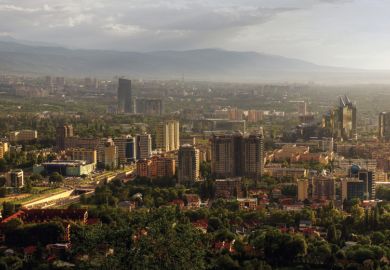The global higher education community “likes to deceive” itself that academic corruption such as the granting of unmerited qualifications and favouritism towards students or staff happens “somewhere else” and needs to face the issue head-on.
That was one of the views of Sir John Daniel, research associate for the Canadian distance education and training network Contact North and former vice-chancellor of the Open University, who was speaking as part of a panel on the webinar “Combatting Academic Corruption: What Might the International Quality Assurance Community Do?”, which was organised by the Council for Higher Education Accreditation’s International Quality Group (CIQG).
Sir John told the audience that the global sector often skirts around the word “corruption” because it is “ugly”, preferring euphemisms such as “misconduct” or “misrepresentation”. He said that quality assurance bodies in particular needed to confront the issue because the consequences beyond higher education could be serious.
“Corruption affecting the integrity of a university’s academic operations…can affect society and government generally,” he said.
“There’s an obvious danger to organisations and the public if people are employed on the basis of phoney credentials or even genuine documents and transcripts that do not accurately reflect a graduate’s learning outcomes and achievements.”
Responding to a question posed by Times Higher Education after the webinar, Sir John said that students with degrees that had “not been earned properly” constituted one of the biggest academic corruption problems facing global higher education.
“[These] students do not have the skills/knowledge that those trusting the certification have a right to expect,” he said. “This is not just [about] fake or fraudulent certificates, but also grade inflation, [giving] passes to those who did not satisfy the requirements.”
Goolam Mohamedbhai, former secretary general of the Association of African Universities, agreed with Sir John, saying that the academic community shies away from “corruption” because it is a “dirty” word. He said that institutions should be “creating awareness and sharing resources and experiences” to help combat it.
In her presentation, Manja Klemenčič, lecturer in sociology of higher education at Harvard University, warned about the dangers of academics singling out some students for favours.
She said that although scholars were not able to show favouritism by granting “access to teaching fellowships and research fellowships”, they could give “preferential treatment” by inviting some students to conferences, “involving them with their research projects” or “opening doors to internships to companies with which they have connections”.
She added that she viewed students as allies in combating academic corruption.
“One of the most effective practices [is] when students share responsibility to prepare the rules [for preventing corrupt behaviour] and then uphold [them],” she said. Citing examples of student journalists in Romania and Serbia, she said that students were helping “raising awareness of corrupt practices” and “demystifying it by bringing it up to the public eye”.
“Student [journalism] is one of the areas I would very much like to see being offered more support, through sharing of resources to training and supporting independent student journalism on campuses,” she said.
“It can play a significant role in raising awareness about corruption and tackling the problem in higher education institutions.”
Register to continue
Why register?
- Registration is free and only takes a moment
- Once registered, you can read 3 articles a month
- Sign up for our newsletter
Subscribe
Or subscribe for unlimited access to:
- Unlimited access to news, views, insights & reviews
- Digital editions
- Digital access to THE’s university and college rankings analysis
Already registered or a current subscriber?


